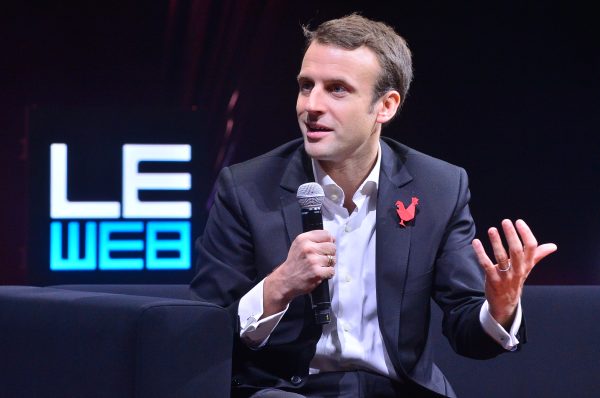Macron Will Not Save Us
© D'HALLOY / IMAGE & CO
Macron’s potential victory in the French presidential election will have severe implications for the future political climate of the country. (COURTESY OF OFFICIAL LEWEB PHOTOS VIA FLICKR)
May 6, 2017
Emmanuel Macron made history as the first candidate not of a major party of the Fifth French Republic to win the first round of a Presidential election, carrying 24 percent of the vote to continue against far-right candidate Marine Le Pen in the runoff on May 7. Europe has once again been faced with the rise of far-right extremism, only this time it managed to push back and weather the storm, for the time being. However, the enthusiasm for Macron and his banners of centrism and liberalism overlooks the inability of those forces to build a lasting opposition to the far-right. Macron is no radical, and his politics are, in practice, almost identical to those of the third-wayers and grand bargainers who marched the world to its current crisis. His success can only temporarily subdue the rising forces of reactionary extremism personified by Marine Le Pen and the Front National.
Macron’s popularity can be difficult to understand on its face. After all, he ran on a platform consisting of remarkably similar policies to those of the incumbent Hollande administration, currently at an approval rating of four percent. The centrist upstart served as Hollande’s independent Minister of Economy, and currently extols the virtues of “labor market flexibility” (read: deregulation and lower wages) on the campaign trail. Conversely, Benoit Hamon, the candidate of Hollande’s Parti socialiste, resigned from the government in protest of those same unpopular reforms. Despite this, he received only six percent of the vote, largely due to the fact that he was still made to carry Hollande’s baggage. This was a consequence of Macron successfully using his immense charisma and talent for rhetoric to separate himself effortlessly from the establishment in the electorate’s mind. To understand the 39-year-old former investment banker, it is important to understand the parallels to the rise of Barack Obama. Both are young, charismatic politicians with the kind of talent that only occurs once or twice in a generation and who are the standard bearers for a reasoned, centrist neoliberalism. Like Obama, Macron will not be capable of creating a movement that can carry on without him; it would be difficult for any would-be successor to garner the same crowds on the same empty platitudes.
One of the lasting reminders of the 2016 American presidential election is that, when faced with the potential of electoral disaster resulting from its own failure to appeal to the material conditions of the working class, the agents of neoliberalism will inevitably place all blame on the left. After the upset victory of Donald Trump, legions of hacks penned passionate screeds in Salon, The Washington Post and The Daily Beast about how Hillary Clinton lost because of the inability of “BernieBros” and far-leftists to fall in line behind her. Similar headlines have already begun to appear in those same publications on the situation in France. Much has been made of the decision of leftist Jean-Luc Mélenchon, who narrowly failed to make the run-off with 20 percent of the vote, to leave the question of a Macron endorsement to a poll of the members of his radical political movement. The New York Times originally reported on this in an article with the misleading title “Marine Le Pen Gets a Lift from an Unlikely Source: The Far-Left.” This line of accusation is only a misrepresentation designed to beat the left into submission to neoliberalism. After all, Mélenchon has been firm on the point that a Le Pen endorsement is out of the question; indeed, it is not even an option in the internal poll, and regardless of whether or not he receives an official endorsement, it is certain that the majority of the leftist’s supporters will side with Macron in the second round.
To believe that Mélenchon refrains from endorsement to appeal to the far-right is to fail to understand the kind of movement being built in “La France insoumise.” That the decision has been left to the people, “les insoumises” themselves, is a reflection of the fact that any movement with the power to challenge fascism permanently in Europe and elsewhere must be democratically accountable to its base. The only force that can deal a lasting blow to the populist right is a real working class movement of the left, which also carries forward the specific concerns of working class women, people of color, and queer folks. The power of this kind of movement can only be sustained through radical democracy that prevents people’s power from being subverted by the rich, privileged and powerful.
On May 7, it is almost certain that Emmanuel Macron will be elected the 25th President of France. Once in office, he will undoubtedly introduce neoliberal reforms that will extend the working week, reduce the strength of the social safety net, and worsen the feelings of powerlessness and resentment that have led so many far-right demagogues into the limelight. In order to challenge these sentiments, the left must spring into action. The only way to defeat fascism in France is for the leftist forces that have rallied around the Mélenchon campaign to agitate, educate and organize to build a sizable working class movement. If these conditions are met, Le Pen and French fascism as a movement will be doomed.














Breck Ridge • May 10, 2017 at 9:50 am
Will Macron do anything about the areas of Paris and France that forbid women ?
Will he continue the open immigration policies that allow hordes terrorists to walk in ?